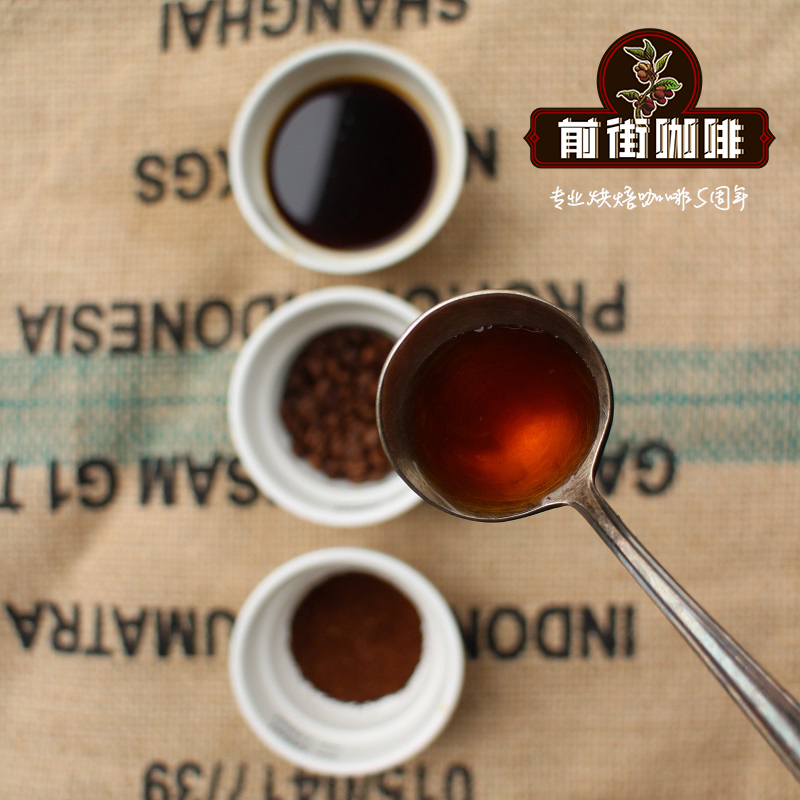Arabica coffee varieties ~ baking methods and flavor characteristics of giant elephant beans?
Arabica Coffee Variety ~ Giant Elephant Bean (Maragogype) baking method and flavor characteristics?

The giant in the coffee beans
The giant elephant bean (Maragogype) is a variety of Tibica (Arabica native bean); its tree, leaves and fruit are much larger than the average Arabica. By the following Kaddura (Caturra/ bourbon system)-giant elephant bean coffee fruit / leaf comparison, is it a clear comparison of its gigantic size?
If the previous description is not enough to highlight the size of the giant elephant beans, then let the numbers speak for themselves. First, let's take a look at the usual measurement methods in the coffee industry.
The industry describes the size of raw coffee beans as a unit of 64 inches.
The international practice of the size of the class distance between 9: 22
The score represents the diameter of the screen; the bean order is the molecule. If the bean order is large, the molecule is big; if the bean order is small, the molecule is small.
The big raw bean at 1:16 refers to the coffee raw bean that can pass through 17 inch 64 (inch) but get stuck in 16 inch 64 (inch) mesh diameter (diameter) sieve.
The big raw bean at 2:18 refers to the coffee raw bean that can pass through 19 inch 64 (inch) but get stuck in the 18 inch mesh 64 (inch) diameter (diameter) screen.
Converted to metric system, 17 eyes are 6.75mm, 18 eyes are 7mm, 19 eyes are 7.5mm. Do you know the size of raw beans more clearly?
Let's put aside the difficult math problems and take a look at the real world. Take Colombia, which attaches great importance to raw bean size as a coffee grade standard, as an example, the top coffee bean (that is, the largest raw bean) is Supremo, and the evaluation standard is 17-18 mesh size.
[aroma] the imported giant elephant beans are 98% in size more than 20 mesh. In other words, Colombia is far better than Supremo.
The size of giant elephant beans (before baking) is amazing.
Giant elephant beans (roasted _ medium baked) are larger in size.
This kind of beans are seldom seen on the market.
Rare quantity and high price have always been the fate of boutique coffee beans. Compared with the giant elephant beans with less output than other varieties, it is self-evident that the price of its high-quality beans is high. As the saying goes, there are a lot of good things, and the following is worth taking a look at the reaction from the actual visit to the market.
Raw beans are expensive: water can carry a boat and overturn it. The giant elephant bean is unique.
The conditions include that too high trees are not easy to harvest and too large fruits are not easy to wash (refer to the overview of fine (top) coffee) and other factors, resulting in low willingness of coffee farmers. Thus, the output is scarce and the material is precious.
Baking is not easy: big beans are extremely important to the quality of the roaster and the baker's skill.
For a severe test. With a little carelessness, the baked beans are either raw or overcooked. What is even more frightening is that the baking is uneven, both raw and cooked.
Misconception: the shortcomings of beans mentioned in many coffee books and teaching materials.
Although the beans are beautiful, the contents are thin, the flavor is insipid, and so on. Indeed, in the early days and even today, bean merchants introduced consumers who valued the appearance of beans because of the beautiful size of elephant beans. Unfortunately, as a result of cost considerations, most of the low-altitude elephant beans were introduced. Just in line with coffee storytellers and the owners of bakeries and cafes, such as beans are not good beans.
[high altitude] the planting environment above 1500m.
Like tea, the high-altitude giant elephant beans, which are ripe at lower elevations and grow for two months, continue to enrich the coffee fruit through photosynthesis. This is the key to the taste of giant elephant beans compared to ordinary elephant beans.
The giant elephant beans are much larger than other beans because of their large size. Therefore, manual screening and strict quality control can ensure that 98% of raw beans are larger than 20 mesh.
[baking conditions] soybeans like this are not easy to heat and difficult to dissipate heat. Without this kind of bean baking experience or without a roaster with powerful locking temperature, it will be easy to produce beans that are overcooked and overcooked in the baking process. Or the phenomenon of raw and uneven cooked beans in the same pot. As can be seen from the picture of cooked beans above. The appearance of beans with a nearly uniform hue represents a successful baking process.
Unscrupulous operators impersonate "Blue Mountain"
It is precisely because of its large size and good sales. Many unscrupulous operators use elephant beans in whole or in part as blue mountain beans and sell them to downstream bakeries / cafes at five times the price, which is eventually passed on to consumers. Japanese bean merchants have been directly involved in the operation of the blue mountain area for a long time, and most of the good quality blue mountain beans have long been under their control. How can other national bean merchants get really good blue mountain beans? Especially in recent years, the pests in the blue mountain producing areas are serious, and in the case that fruit bugs are rampant and can not be effectively stopped, the really good blue mountain beans are less and less than in previous years. Japanese consumers have been drinking high-quality high-quality beans for a long time, and their average national income is among the best. There is little chance that Japanese businessmen will resell blue mountain beans that can be sold at higher prices in Japan to other countries at lower prices.
Many people have commented that the blue mountain beans, the national treasure of Jamaica, have a "silk-like" flavor, which means that they are not bitter, sour, sweet or astringent; they are moderate and mild in taste. for the public who used to be used to light coffee, they are precious coffee beans that they want soon after. Today, coffee products have developed to emphasize "the beauty of personality, the taste of region" and the special flavor cultivated by different Arabica varieties under very different local conditions. Drawn to the Blue Mountains, apart from not being able to really appreciate the good taste of coffee, there is also a great possibility of buying [giant elephant beans] at unreasonably high prices.
Special flavor, like drinking scented tea
If the traditional rich and bitter coffee is not popular with you, try the [aroma] giant.
Like beans: nutty aromas, clean apple / lemon acidity; full, smooth palate and persistent throat rhyme. And a hint of bitter apricot and chocolate.
Important Notice :
前街咖啡 FrontStreet Coffee has moved to new addredd:
FrontStreet Coffee Address: 315,Donghua East Road,GuangZhou
Tel:020 38364473
- Prev

Pacamara | what are the flavor characteristics of the derived species of Pacamara and Pacas?
Pacamara | what are the flavor characteristics of the derived species of Pacamara and Pacas? El Naranjo Dipilto. Orange Fruit Manor (Best of Nicaragua winning Manor | Award record: 2016. 1st) Variety: Pacamara Manor: Luis Emilio Valladarez Zelaya producing area: Nueva Segovia (New Sagovia) City:
- Next

Giant Elephant beans | what's the difference between washed elephant beans and Arabica? Do elephant beans taste good?
Giant Elephant beans | what's the difference between washed elephant beans and Arabica? Do elephant beans taste good? Buenos Aires. Buenos Aires Manor (C.o.E. Winning Manor | Award record: 2015. 1st) Variety: Maragogype Manor owner: Luis Emilio Valladarez Zelaya producing area: Nueva Segovia (New Sagovia) City: Dipilto, etc.
Related
- Detailed explanation of Jadeite planting Land in Panamanian Jadeite Manor introduction to the grading system of Jadeite competitive bidding, Red bid, Green bid and Rose Summer
- Story of Coffee planting in Brenka region of Costa Rica Stonehenge Manor anaerobic heavy honey treatment of flavor mouth
- What's on the barrel of Blue Mountain Coffee beans?
- Can American coffee also pull flowers? How to use hot American style to pull out a good-looking pattern?
- Can you make a cold extract with coffee beans? What is the right proportion for cold-extracted coffee formula?
- Indonesian PWN Gold Mandrine Coffee Origin Features Flavor How to Chong? Mandolin coffee is American.
- A brief introduction to the flavor characteristics of Brazilian yellow bourbon coffee beans
- What is the effect of different water quality on the flavor of cold-extracted coffee? What kind of water is best for brewing coffee?
- Why do you think of Rose Summer whenever you mention Panamanian coffee?
- Introduction to the characteristics of authentic blue mountain coffee bean producing areas? What is the CIB Coffee Authority in Jamaica?

